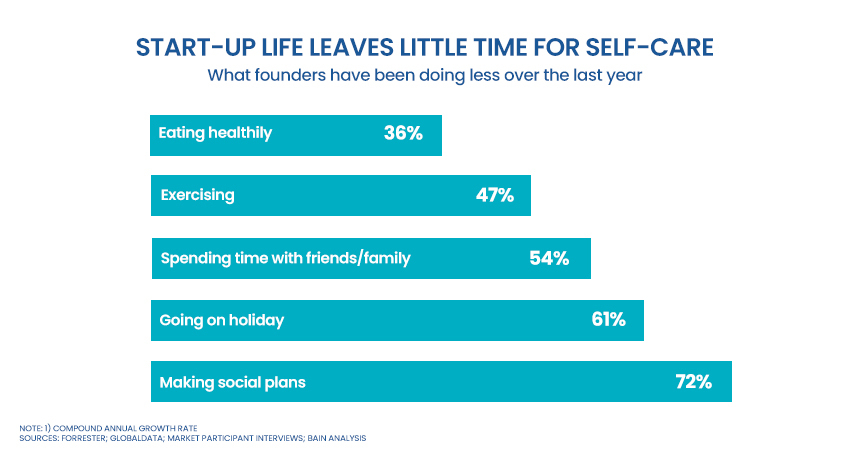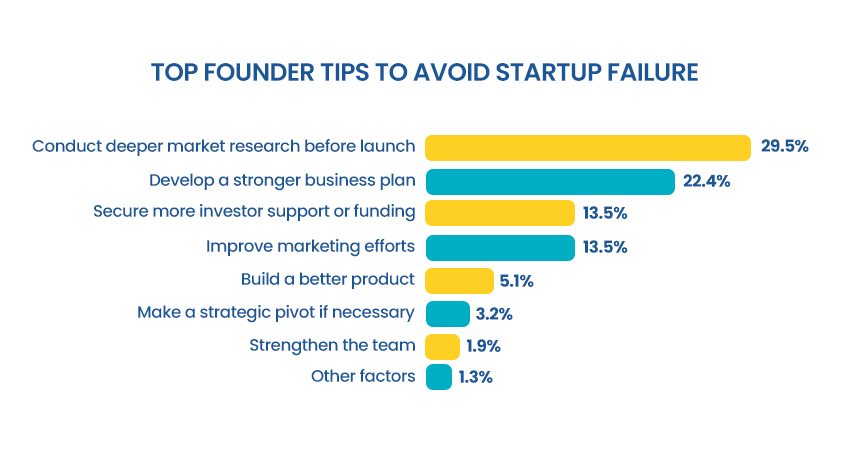
The Head Game: Mental Models That Help Founders Survive Year 1
According to the U.S. Bureau of Labor Statistics, one in five new U.S. businesses fail within their first year, and two-thirds of startups don’t last 10 years. The truth is, there is no single reason behind these failures; market misfit, cash crunch, burnout, and countless other factors play a role.
Starting up is rough. One day, you feel unstoppable. The next time you are staring at your bank balance, a half-built product, and a stack of unanswered investor emails. Most founders say Year 1 feels like building the plane while flying it. That is tough but normal in the world of startups. The real goal is to stay in the game long enough to learn what works. This blog blends real founder stories and data-driven insights to help you survive the head game of a startup’s first year.
Why Year 1 Hits So Hard
Most startups do not fail with one big blow. They wear out slowly with tired founders, tight cash, confused customers, and early hires that may not work out as planned.
The mental strain creeps in without warning. A study of 242 entrepreneurs found that 30 % had depression, 29 % had ADHD, and nearly half faced some mental health challenge. According to Sifted’s Founder Mental Health report, more than half of the respondents reported feeling burned out, 75 % felt anxious, and many struggled with sleep.
Add to this the pressure of hiring the right first team, winning your first 100 customers, and keeping investors confident. It feels heavy, but you are not alone. Many successful founders have navigated similar challenges and emerged stronger. How? Let’s uncover the models that made the difference and helped them succeed.

Mental Models That Keep Founders Grounded
Founders who make it through Year 1 tend to focus on a few practical mindsets and habits. Here are nine key ones, explained with relatable stories and simple actions.
1. Survival Math
Cash is like oxygen for your startup. Without it, nothing else matters. Review your cash flow weekly to see how many months you can last, and divide the money you have by what you spend each month. This simple monitoring of your finances can save you from sudden shocks.
However, survival isn’t just about tracking numbers. It’s also about being ready to act when things get tight. Take Airbnb, for example. When they saw their cash running low, the founders didn’t wait for investor miracles. They acted fast with a quirky yet strategic idea by selling Obama and McCain-themed cereal boxes during the 2008 election. That creative move generated $30,000 and gave them the time to improve the product. It wasn’t the cereal that saved them, but their habit of checking cash flow regularly and acting early when the numbers called for it.
2. Milestone Thinking
Trying to do everything at once can kill focus. Break the first year into small, clear goals. Ask yourself: What must I achieve in the next 30 or 60 days to move forward? It could be finding your first 10 paying customers or getting one key product feature ready.
Drew Houston, founder of Dropbox, set one clear first Milestone: show that people cared about simple file sync. He recorded a short screen video, posted it, and people signed up before the full product was even available. That sign-up list was proof that he could show investors and serve as a guide for what to build next. That is Milestone Thinking in action.
3. Market Pull Over Product Love
Brands often fall in love with their product and forget to ask if customers truly need it. The real signal comes from the market, so listen closely. Speak with users on a weekly basis, observe their responses, and be prepared to make adjustments promptly.
Slack started as a gaming company. But the game wasn’t what people cared about. The internal chat tool the team built for themselves got all the attention. They listened, pivoted, and built Slack into the product we know today. Success came because they adapted what customers truly needed.
4. Learning Loops (OODA – Observe, Orient, Decide, and Act)
Trying to make everything perfect from the start can slow you down more than you think. What matters early on is how quickly you learn. That’s where the OODA loop, which stands for Observe, Orient, Decide, and Act, comes in. It’s not about getting it right the first time. It’s about running quick experiments, learning what works and what doesn’t, fixing things fast, and moving forward. Even when you fail, you’re failing forward, and that’s how real progress happens.
A Harvard Business School study of 35,000 startups found that teams using quick A/B tests grew faster. They saw around 10% more weekly traffic, launched up to 18% more products, and had better chances of getting funding compared to those stuck in long planning cycles.
Nykaa followed a similar path. They paid close attention to how customers searched and shopped, tried out new content, stocked trending products, and learned what clicked week after week. This rhythm of testing and learning built customer trust and helped them scale smartly.
5. Premortem Planning
Do not wait for problems to catch you off guard. Picture the worst-case scenario before it happens. Ask your team, “If our startup failed six months from now, what could be the reasons?” This simple exercise helps you spot risks early.
This technique, called a premortem, improves risk detection by 30% compared to regular planning. It uncovers blind spots like cash gaps, product flaws, or hiring mistakes long before they become serious roadblocks. Founders who run monthly premortems often avoid costly surprises because the team gets real about what could derail progress and fixes issues before they explode.
6. Small Wins Principle
Year 1 can feel like a marathon without a finish line. Celebrate every small win, from your first customer and a kind review to a working feature. These moments keep the team motivated and their energy alive.
In a research that analyzed nearly 12,000 daily diary entries from 238 professionals working in 26 project teams across 7 companies, Teresa Amabile and Steven Kramer found that making progress on meaningful work is the biggest boost to motivation and mood. Even tiny steps forward matter because they create a sense of momentum that pushes people to keep going.
7. Growth Mindset Language
Startups rarely get everything right on the first try, and that is normal. Founders with a growth mindset see every setback as a lesson, not a verdict on their abilities. Studies show that people with this mindset are 30% more persistent and 47% more willing to take on tough challenges. 80% of the entrepreneurs credit this attitude for their success. Saying “We haven’t figured it out yet” keeps the team motivated.
8. Energy Bank
We live in a world that never really switches off, and sleep is often the first thing we compromise. In a survey of over 180 business leaders, 43% said they struggle to get enough sleep on at least four nights each week. Missing out on rest not only leaves you tired but also chips away at clear thinking, decision-making, and leadership, which can ultimately affect the bottom line.
Founder surveys from Sifted also reveal high burnout and widespread sleep issues in early-stage teams.
9. Relationship Health
Conflicts between co-founders can topple startups faster than any other problem. Speak openly, establish clear roles, and check in with each other regularly to keep the partnership strong.
According to research cited in The Founder’s Dilemmas by Harvard professor Noam Wasserman, around 65% of high-potential startups fail due to co-founder conflicts. First Round’s State of Startups surveys consistently highlight co-founder issues among founders’ top challenges. Founder Mindset research also shows that unresolved tension among co-founders often undermines execution later.
Strong partnerships grow from straight-up honesty and respect. A quick over-coffee check-in or a dedicated weekly sync can surface small frustrations before they turn into major cracks in your foundation.

A 4-Week Mental Fitness Plan
Week 1: Know Your Numbers
Your cash, burn rate, and runway are like your vital signs. Check them each week and determine how many months you can continue to do so. Define one clear Milestone for the month so you know where you are heading.
Week 2: Talk To Users
Spend more time understanding your customers, not just building your product. Try aiming for 10 real conversations this week. Ask about their pain points, observe their reactions, and take notes. These insights are often more valuable than any marketing report.
Week 3: Protect Energy
Your energy is precious; it sets the tone for your team. Track your sleep and stress levels for a few days. Share simple mental health resources or a short break plan with your team — small habits, such as taking walks, pausing, or conducting team check-ins, can help keep everyone balanced.
Week 4: Show Progress
Do not wait for a big launch to celebrate; celebrate now. Share small wins with your team and investors. A short progress email or update call not just stimulates morale but also reminds everyone that progress, no matter how small, is still progress.
Key Insights In One Look
| Model | What Goes Wrong | Habit That Helps |
| Survival Math | Burn cash too fast | Weekly runway check |
| Milestone Thinking | No clear fundraising goal | Set one milestone per raise |
| Market Pull | Building what no one wants | Talk to users every week |
| Learning Loop | Slow response | Quick weekly OODA review |
| PreMortem | Risks ignored | Monthly failure scenario check |
| Small Wins | Team morale dips | Celebrate daily progress |
| Growth Mindset | Setbacks seen as failures | Reframe as learning moments |
| Energy Bank | Burnout | Protect, rest, and recover |
| Relationship Health | Co-Founder clashes | Monthly alignment calls |
Final Thought
Founders who survive Year 1 are not always the ones with the best funding or the flashiest product. They are the ones who watch their cash closely, listen to customers, protect their mental energy, and maintain trust with their teams. Money keeps the business alive, but the mindset keeps the founder alive. It is this resilience, patience, and ability to keep moving forward, even on the toughest days, that truly distinguishes successful founders. Year 1 is about learning to take hits and still show up. Stay in the game, because every step you take builds the foundation for what comes next.




